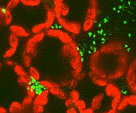Plant Pathology, Department of

Department of Plant Pathology: Faculty Publications
Document Type
Article
Date of this Version
2-1997
Citation
Marçon, A., Kaeppler, S. M., and Jensen, S. G. 1997. Genetic variability among maize inbred lines for resistance to the high plains virus–wheat streak mosaic virus complex. Plant Dis. 81:195-198.
Abstract
High plains virus (HPV) is a pathogen that causes a severe disease, especially in susceptible corn genotypes. The virus is transmitted by the eriophyid mite Aceria tosichella, which also transmits wheat streak mosaic virus (WSMV). This often results in a mixed infection by these two viruses. Genetic variability for resistance to the HPV exists among maize inbred lines but has not been characterized. The disease reaction of 30 maize inbred lines to the mixed infection and to WSMV alone was characterized in this study. Evaluation was based on symptom expression and virus titer (HPV and WSMV), as measured by enzyme-linked immunosorbent assay. All lines showed some HPV symptoms, which ranged from a few visible spots to rapid plant death. HPV-resistant inbreds include B73 and B14. Susceptible inbreds include W64A, Wf9, H100, N213, N215, and N194. Five of the six inbreds most severely affected by HPV also had a high WSMV titer, although they displayed few symptoms when inoculated with WSMV alone. Inbred N194 was one of the genotypes most susceptible to HPV, but it showed no detectable WSMV titer. Seedlings of highly susceptible genotypes often died within 2 weeks of infection.


Comments
Copyright 1997 The American Phytopathological Society. Used by permission.